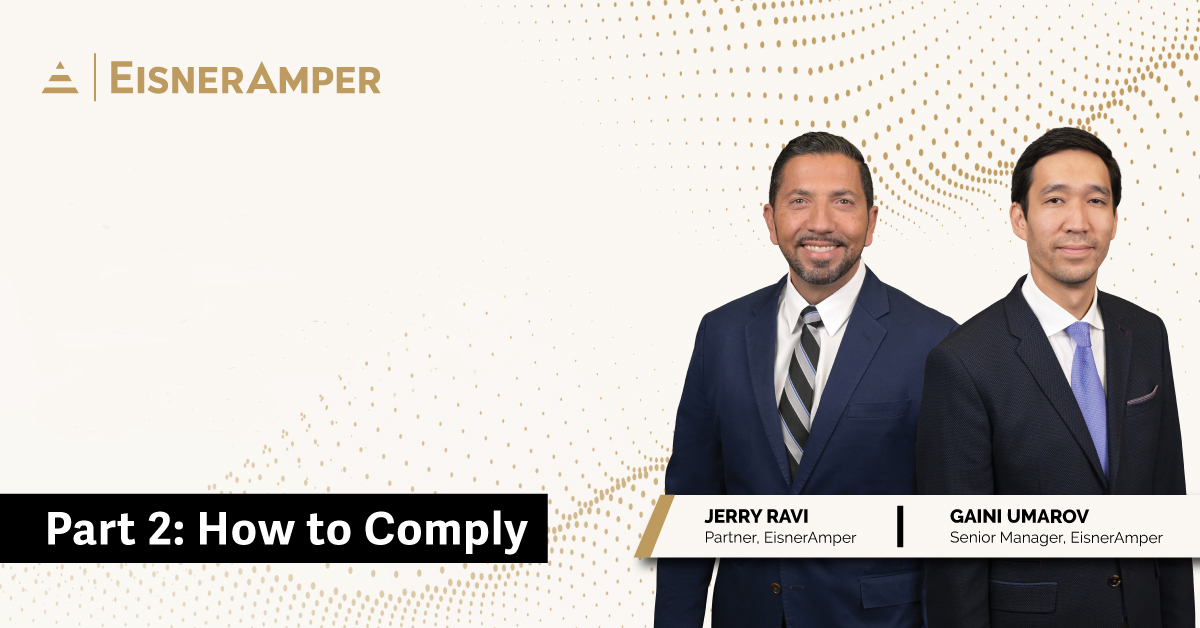
The Coming Investment Adviser Anti-Money Laundering Requirements
- Published
- Mar 21, 2017
- Share
Overview
In late 2015, The U.S. Treasury Department’s Financial Crimes Enforcement Network (“FinCEN”) proposed a rule revising the definition of “financial institution” under the BSA thereby requiring SEC-registered investment advisors (“RIAs”) to implement robust anti-money laundering (“AML”) programs. Since the rule was proposed, U.S. policymakers have taken a more deregulatory posture, which may lead RIAs to believe they will not be subject to AML requirements.
However, recent comments by FinCEN officials indicate that the proposed rule will go final in the near future.1 The reasons relate primarily to national security. In proposing the rule, FinCEN identified RIAs as a vulnerability in the financial system,2 and prevention of money laundering and terrorism is a priority of the current administration.
RIAs operating globally are also subject to a multitude of AML regulations. Most recently, the U.K. announced plans to create a new agency with the Financial Conduct Authority (“FCA”) called the Office for Professional Body Anti-Money Laundering Supervision, with the objective of harmonizing current regulations to better prevent money laundering and terrorist activities.3 Regulators in the European Union, Singapore and Hong Kong have also made AML regulation a priority for financial institutions, including asset managers.
Aside from direct regulation, RIAs have had to establish AML programs in order to effectively operate in their financial eco-system. For instance, fund managers onboarding new investors typically need to meet the AML requirements of third-party service providers, such as fund administrators or custodians, or may have affiliated broker-dealers that have had to comply with the Bank Secrecy Act (“BSA”) for many years. To mitigate their risks, asset managers should perform adequate due diligence on third parties when outsourcing AML-related tasks.
Proposed Rule Summary
By expanding the definition of “financial institutions” under the BSA, RIAs would be subject to additional regulations, such as recordkeeping and filing currency transaction reports. For AML-related regulations, the SEC would have examination authority over RIAs, but FinCEN would hold enforcement authority.
RIAs will be required to file suspicious activity reports (“SARs”) with FinCEN within 30 days of discovery of a suspicious transaction, which includes all types of criminal activity including fraud. In monitoring for suspicious activities, RIAs should think broadly about various issues, such as insider trading or cybersecurity incidents, when considering whether or not to file a SAR. The proposed rule also would mandate that advisers to file currency transaction reports, meet AML recordkeeping requirements, and follow information sharing rules.
Fundamentally, RIAs should cover the traditional 4 Pillars of an AML program :
- Written policies, procedures and effective internal controls commensurate with the level of risk;
- Periodic independent testing of the AML program conducted by either (a) someone outside the RIA or (b) an employee or affiliate of the RIA provided they are not involved in the operation or oversight of the AML program;
- Designation of an AML Compliance Officer who must be “knowledgeable and competent” on the regulatory requirements; and
- Regular AML training for employees.
There may be a “5th Pillar” as well. FinCEN issued its customer due diligence (“CDD”) in May 2016 requiring financial institutions to include the following four (4) requirements in their AML programs:
- Customer identification and verification;
- Beneficial ownership and verification;
- Understanding true nature and purpose of customer relationships; and
- Ongoing monitoring for reporting suspicious transactions and, on a risk basis, maintaining and updating customer information.
Items (C) and (D) are considered to be the 5th Pillar of AML programs.
The timing of the FinCEN rule remains an open question. Nevertheless, RIAs should be taking necessary steps to implement and enhance their AML programs to address the applicable regulations and risks associated with money laundering and terrorist financing activities.
1 https://www.financial-planning.com/news/anti-money-laundering-rule-looms-for-advisers, FinancialPlanning, March 8, 2017.
2 Department of the Treasury, Financial Crimes Enforcement Network, 31 CFR Chapter X, RIN 1506–AB10, Anti-Money Laundering Program and Suspicious Activity Report Filing Requirements for Registered Investment Advisers, Federal Register, Vol. 80, No. 169, Tuesday, September 1, 2015, Proposed Rules.
3 https://www.gov.uk/government/news/uk-tightens-defences-against-money-laundering, U.K. Government, HM Treasury, March 15, 2017.
Contact EisnerAmper
If you have any questions, we'd like to hear from you.
Receive the latest business insights, analysis, and perspectives from EisnerAmper professionals.











